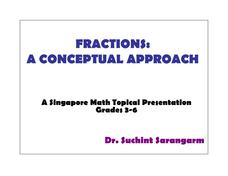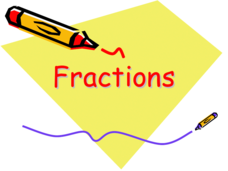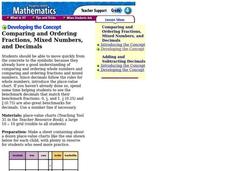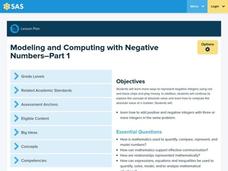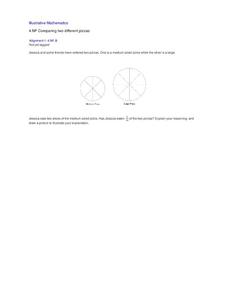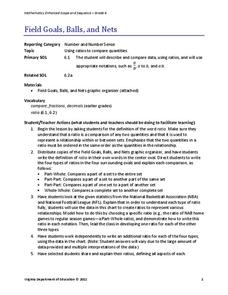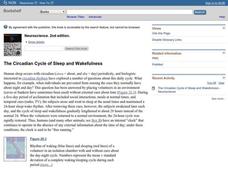Curated OER
Subtracting Mixed Numbers
In this math worksheet, students subtract mixed numbers. Students find common denominators. They subtract the fractions and whole numbers.
Curated OER
Fractions: A Conceptual Approach
If you are teaching fractions to elementary learners this year, this Singapore Math presentation is essential to your curriculum. It addresses several basic fractions concepts in conceptual terms and figures, making each idea accessible...
Curated OER
Fraction Introduction
Introduce fractions as a part/whole relationship. The slides in this resource show whole objects, half objects, and then relate the images to their numeric equivalent. This is a simple and basic introduction that uses a variety of...
Curated OER
Fraction Shape Amounts
Part/whole relationships mean it's time to practice fractions. This slide-show makes reviewing fractions a colorful and fun activity. Learners work through the first seven slides to identify the shaded amount, solve two parts of a given...
Curated OER
Comparing Apples With Apples 1
Elementary schoolers observe and demonstrate how to add and subtract fractions with like denominators. They observe the teacher model a variety of fraction addition and subtraction problems and use fraction strips to complete a worksheet.
Curated OER
Fractions
The world of fractions is the focus of this math PowerPoint. Young mathematicians are introduced to terms such as: numerator, denominator, equivalent, and fraction bar. Two test preparation slides are included, as well as a slide that...
Curated OER
More Complex Fraction Problems
If your fifth graders have mastered fractions, push them to the next level! They multiply fractions by whole numbers and decimals (in the form of money math). The activity provides space for pupils to write out their work, based on two...
Curated OER
Add Mixed Numbers With Like Denominators (B)
In this adding mixed numbers activity, students find the sums by adding mixed numbers with common denominators and reducing the answer to lowest terms. Students solve 7 problems.
Corbett Maths
Mixed Numbers to Improper Fractions
Mix things up a little to be improper. The presenter shows three example of changing a mixed number to an equivalent improper fraction. Scholars work several practice problems and application questions to refine the process.
Education Development Center
Adding Fractions with Unlike Denominators
If the fractions don't have a common denominator, make them have one. Learners first read and analyze a conversation of pupils trying to add 2/5 and 1/2. They compare the process of adding fractions to the process of adding quantities...
EngageNY
Comparing Integers and Other Rational Numbers
The ninth installment of a 21-part module has pupils compare integers and rational numbers in decimal and fraction form. They match stories to number lines and compare values in the stories.
Curated OER
Understanding Fractions - Cookbook Comparisons
Learners explore equal fractions in relationship to a whole unit. They fold strips of paper into halves, thirds, etc. and compare them to the first strip which represents a "whole unit." Fractional parts are identified and compared.
Curated OER
Fractions
Fourth graders use pattern blocks and fraction identification cards to create and identify fractions. In this fractions lesson plan, 4th graders identify fractions in a pizza, and make fractions with markers.
Curated OER
Comparing and Ordering Fractions, Mixed Numbers, and Decimals
Young scholars practice comparing and ordering fractions, mixed numbers, and decimals. In this fractions, mixed numbers, and decimals instructional activity, students examine a decimal place value chart compared to a whole number place...
Curated OER
Equivalent Fractions
If you are looking for a simple way to review equivalent fractions, this is a great resource. Using a visual means and a series of examples, learners review this skill. There is a worksheet provided and a prompt to encourage pupils to...
Curated OER
Equivalent Fractions
Introduce elementary students, grades 3-5 to the concept of equivalent fractions. Each student folds a paper in half and color one of the equal parts of the paper. They use this paper to define numerator, denominator and the idea that a...
Curated OER
Popcorn Fractions
Upper graders explore fractions to determine a fractional part of a whole. They are given 30 pieces of popcorn and asked to divide it into halves, thirds, etc. Students practice representing the popcorn groups as a numerator and...
Curated OER
Dividing with Fractions
Use paper strips or models to relate division problems to division of fraction problems. Since the materials can be broken up, it helps them to show how they can complete repeated subtraction with fractions and not just whole numbers.
Curated OER
Part of a Whole Group One
In this fractions worksheet, students solve word problems where they solve problems about parts of whole groups using pictures, charts, and more. Students complete 4 problems.
Illustrative Mathematics
Comparing Two Different Pizzas
What better way to learn about fractions than with a couple pizzas? Help Jessica figure out how much of the pizza she has eaten, while teaching your class that fractions refer to a specific whole amount. This problem will be challenging...
Northern Arizona University
Adding and Subtracting Fractions
Pattern blocks and shapes demonstrate how to add and subtract fractions. By aligning blocks with different shapes, learners figure out how to create a whole, and then how to add and delete parts from that whole.
Curated OER
Division by Fractions (Part Two)
Investigate division through the use of array models. The lesson focuses on using area models to compare division as sharing with division as grouping. Students evaluate the usefulness and limitations of the two array models.
Virginia Department of Education
Field Goals, Balls, and Nets
Score a resource on ratios. Young mathematicians learn about different ways to express ratios. Using sports data, they write statements about the statistics in ratio form.
Illustrative Mathematics
Making Hot Cocoa, Variation 2
Learners are introduced to dividing by fractions in a visual way. Setting up groups from the information in the problem allows them to see what we divide and why. Use with the previous lesson, which can be found in Additional Materials,...

